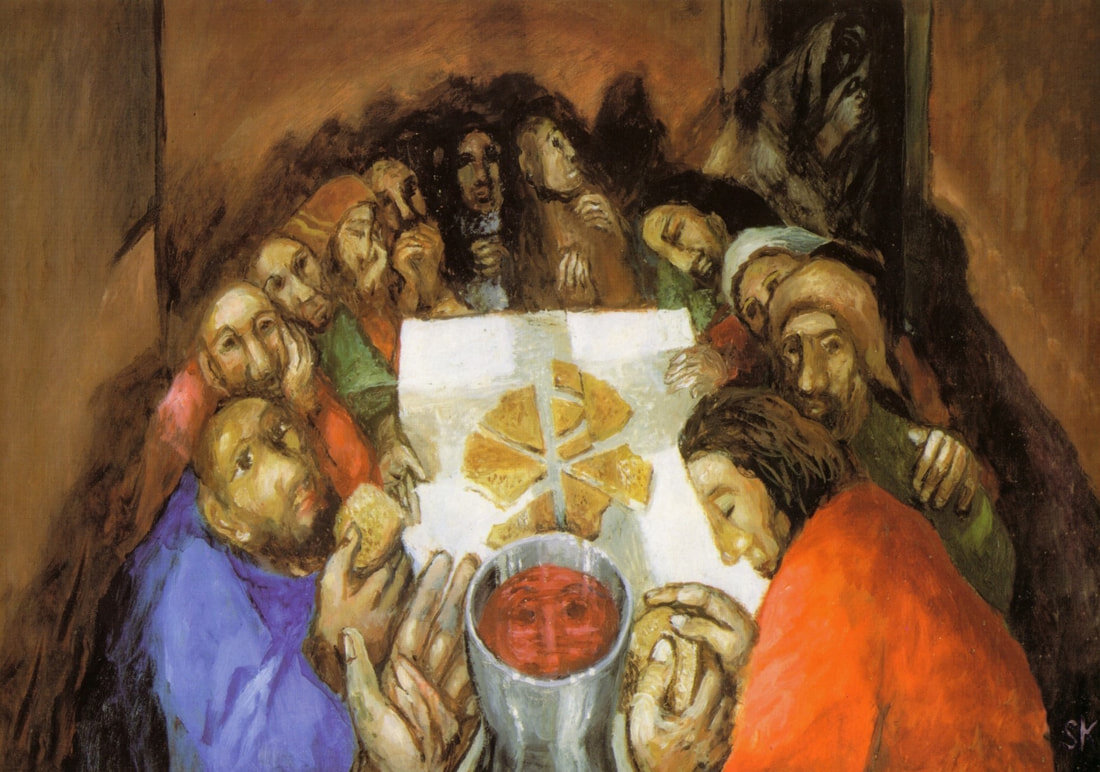The phrase “rule of life” has its roots in the early monastic tradition. Although it was made popular by St Benedict in the 6th century, men and women from the early church (3-5CE) were exploring the question of how they could prioritise and structure their lives in such a way that could foster union with God and meaningful relationship with others and the world in which they lived! They understood that to grow and mature spiritually, they needed a thoughtful, conscious and intentional plan. They called this plan a ‘rule of life’. The word ‘rule’ comes from the Greek word “trellis”. A trellis is a support structure that upholds a plant and helps it grow to its fullest potential. They believed that just like a fruit bearing plant, human beings also need a degree of structure to flourish and be fruitful.
Jesus teaches his disciples that if they are to grow in their relationship with Him and live a life reflective of their God given nature, character and deepest desires ( ie fruitful), they must learn to ‘remain’ in Him (John 15). By the word remain, Jesus is talking about ‘making their home in him’, getting their life from him, learning to abide or dwell in him. He warns them that without him they can do nothing. After all God gives life to humanity and all of creation! That life is sustained in and through him. As a disciple of Jesus we are called to embrace this invitation.
We all have conscious or unconscious rhythms and ways of being that shape how we live. Over the years we have developed very sophisticated defense mechanisms, drivers and habits that influence our choices. Those choices shape how we live and who we become. When we talk about ‘cultivating a rule of life’ we are talking about making conscious and intentional choices about the way we live. We are looking to adopt specific practices and life rhythms that will help us slow down and make time for God, ourselves and others. We are taking to heart what Jesus teaches about abiding in him by ordering our lives in such a way that we are connected, dependant upon, and residing in his agape love. We live in a very demanding, noisy and overstimulated world and this can pull us in many directions. When we cultivate an intentional way of living, we can learn to stay anchored to our priorities and commitments. A good rule of life can be described as an external framework for an interior life. It can help turn our hopes, dreams and godly desires into reality as we seek to respond to our call to follow Jesus.
A good rule of life is not a transactional or legalistic practice. It does not invite us to earn favour or blessings from God - we live by grace. It is not an external law that we must follow to avoid punishment or imprisonment, nor is it a practice that we develop because of shame, guilt, duty or fear. Rhythms and practices are not dictated by a human authority figure, and a good rule of life is not intended to be rigid or paralysing! Life is dynamic - our seasons and circumstances change. Our rule of life is to reflect and support this.
“A good rule can set us free to be our true and best selves. It is a working document, a kind of spiritual budget, not carved in stone but subject to regular review and revision. It should support us, but never constrict us.” —Margaret Guenther
HOW CAN WE CULTIVATE A RULE OF LIFE?
We are all unique and on a journey. Our rule of life should reflect this. There are many resources and books available to help you with the discernment process of what rhythms and practices would be helpful to you in the season you find yourself. That said most the following principles and practices are recommended by most resources.
HELPFUL PRINCIPLES
Start where you are at. Small goals are better than ones that are too unrealistic. One step at a time!
Be really specific. What are you going to do and when. Vague goals like “I need more rest” or “I intend to pray and meditate” need to be translated into rhythms. “My sabbath rest starts on a Friday after work to Sunday morning” I commit to life group on Thursday evenings” Being specific creates anchor points to our week.
Reflect on your season of life. Do you have dependants? Are you working shifts? Don't try and copy someone else's life rhythms - they may have different commitments and pressures. Prayerfully reflect on your responsibilities and season of life. Look to build in practices that will help you keep focused and connected - not burden you.
Keep a balance of practices that will challenge you to grow and you can do with ease and joy! To grow we need challenges, but we also need times of ease. Reflect on practices that you find challenging and commit to one or two. Equally include practices that you find easier and fit with your preferences and who you are.
Keep a balance of spontaneity and structure. Don't become too rigid - or life will become boring or legalistic! Enjoy God's interruptions and call to adventure every now and then!
Reviewing life rhythms and practices. Are your current practices helping you in your relationship with God and others? If not consider why this may be the case. Have an honest conversation with God, allow him to shed light on your intentions, thoughts, and emotions. Discernment is important and understanding our motivations can speak loudly to us. Look to see how you can either work with your current rhythms in a fresh way or simply change your practices to help build a better support structure.
BASELINE PRACTICES
Meditation and contemplative reading of scripture ( Lectio Divina, Ignatian Contemplation & Reading Scripture)
Silence and Solitude. (Getting away by yourself for quality time with God and yourself)
Study
Sabbath (A period of rest to recenter your life, to rest and give thanks)
Simplicity - living simply. (Declutter your life, to slow down, make room for God and others)
Play and Recreation ( Having fun, relaxing)
Service and Mission (Where can you use you gift and talent to serve)
Care for the Physical Body (How is your diet, sleep, exercise?)
Emotional Health (How is your inner life? Do you need to tend to this? Do you need to see a therapist or speak to someone who can help?)
Family (What time do you spend together? How are your relationships? Do you have a date night with your husband or wife? Could you phone a relative once a week to touch base? Do you need to spend less time with certain family members!)
Community (Do you have rhythms for community life and church? How can this become more balanced?)
Giving ( Are you practicing generosity by stewarding your money well, sharing what you have with others, living openly? Sharing your presence?)
QUESTIONS TO THINK ABOUT AS YOU REFLECT ON YOUR RULE OF LIFE
As you prayerfully look over your life, consider how you are currently stewarding your time, energy and resources (including money). Take an honest inventory.
Paying attention to the following areas, what rhythms and practices do you currently have in place?
Your relationship with God
Relationships (marriage, family, friends, church, work, money)
Your deepest self (mind, body, soul)
Would you like to add or exchange any
Which one or two of the practices do you feel drawn to? How might you incorporate them into your life's rhythm.
WALKING IT OUT TOGETHER
Most of us have probably realised by now that the spiritual journey is simple yet highly complex and profound. On the one hand, we share our human experiences, yet on the other, we learn to appreciate that each person's journey is unique. As we think about life, we see that it's full of action, movement, ups, and downs, advances, retreats, change, stops, and starts! Sometimes, life feels fun, stimulating, filled with variety and incredible surprises, but we also know it can be challenging, complicated, and demanding. Either way, it's certainly never static!
As you consider your life practices and rhythms - take a moment to visit the intentional spaces and places at WWV where you can choose to connect, grow and encourage other along the way. Sometimes we have moments when we need to journey alone - in silence and solitude, but life is meant to be walked out with others - who could encourage you in your next steps?












